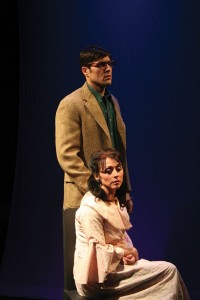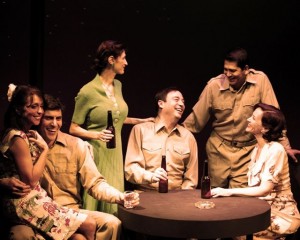MASTERPIECE IN THE MAKING
When an art curator X-rays a famous painting, they occasionally unmask the artist’s original painting underneath the masterpiece; often, it proves to be no less striking, but it illuminates why the artist altered hues, shifted brush strokes, or placed the arm of a sitter in a different position. Nick Salamone’s new intergenerational play, The Sonneteer, is that beautiful, lyrical and exquisite piece of art that is on its way to becoming a masterpiece. Regardless of the changes yet to come, Mr. Salamone has a breathtaking ability to create full-fledged characters using dialogue that is rich with lyricism; he is also a brilliant sonneteer himself. This scholarly writer is known for injecting classicism into his works, such as his book for the musical adaptation of Chekhov’s The Seagull (entitled Gulls), presented at Boston Court in 2008.
In fact, when Livvy (Sandra Purpuro) opens the show with a monologue about her tough talking husband, Louie (Paul Haitkin), it is not immediately apparent that she is delivering a sonnet, so seamless is its construction and the actress’ delivery. Her beautiful sonnets are kept secret from her family; it is one way that she deals with grief about Louie, who was accidentally run over by his brother Michael (Ray Oriel). WWII has ended and the can-do spirit that returned with the boys from the front has inspired family friend Joey (Ed Martin) to further explore his requited love with Michael. Meanwhile, Louie and Michael’s sister Vita has a crush on Joey, and Vita’s friend Ella has a thing for Michael.
 What appears as set-up for a soap opera becomes a thoughtful examination of homophobia and the insidious way that it vivisects family relations. Even amidst the strides that the GLBT community has made in recent years, it is a testament to Salamone’s writing that homophobia can still shock us in the theatre. While Broadway skirts the subject with La Cage Aux Folles and Priscilla, Salamone reminds us that the cancer of homophobia threatens to continue for generations; just as it appears to be in remission, the cancer cells of hatred and fear still replicate within our society.
What appears as set-up for a soap opera becomes a thoughtful examination of homophobia and the insidious way that it vivisects family relations. Even amidst the strides that the GLBT community has made in recent years, it is a testament to Salamone’s writing that homophobia can still shock us in the theatre. While Broadway skirts the subject with La Cage Aux Folles and Priscilla, Salamone reminds us that the cancer of homophobia threatens to continue for generations; just as it appears to be in remission, the cancer cells of hatred and fear still replicate within our society.
But this is not a gay play per se, inasmuch A Streetcar Named Desire and Cat On a Hot Tin Roof are not gay plays; Michael and Joey are not the centerpiece of this family drama, nor is Lucius, Livvy’s gay son who appears as an adult professor in Act II. In fact, the drama that ensues between Livvy and Lucius in the second act is the only area in which The Sonneteer suffers: his homosexuality (and the unnecessary addition of an off-stage lover) takes center stage over the drama of the estrangement with his mother and the effect of homophobia on the family. The play is more fascinating when the subjects of fratricidal guilt and dashed desires are explored. The stand that Lucius takes as a gay man in the 1960s feels a little too easy, and the death of his lover (of whom we know very little) is positively perfunctory. (Knowledge of these plot points will not hinder your experience.) Blanche DuBois and Maggie the Cat’s homophobia – and the subsequent suicides that it caused – instigated drama and conflict, even though we never meet the gay characters (Blanche’s Allen Grey or Maggie’s Skipper).
When Lucius’s Aunt Vita morphs from a vitriolic homo-hater in Act I to acceptance in Act II (even as her closeted brother remains married to her best friend, Ella), it is unclear what premeditated her transformation – it begs to be dramatized. True, Vita helped to raise the boy, but what an interesting choice it would have been to have Vita love her nephew as a mother would, yet remain conflicted. She is, after all, from a first generation Catholic Italian family. The Sonneteer is more powerful when homosexuality is the elephant in the room, and the “love that dare not speak its name” remains tacit. If Mr. Salamone wishes to bookend his play with hatred and approval of homosexuality, it may need the addition of Lucius’s struggle with internalized homophobia to round out what is otherwise a beautiful drama.
For an actress best-known for her work in Musical Comedies, Sandra Purpuro is understated and hauntingly luminescent as Livvy – especially effective when skillfully interpreting Salamone’s extraordinary sonnets. Paul Haitkin brings the steamy hothead Louie to life; less convincing is his seemingly untroubled Lucius. Cynthia Gravinese perfectly embodies big-mouthed and bossy Vita, while Victoria Hoffman and Ed Martin bring a quiet strength and vulnerability to the roles of Ella  and Joey. Sadly, Ray Oriel has yet to internalize the shame and fear within Michael; he may yet find his footing, as he hits his mark with anger and drunkenness, but it still remains a presentational performance replete with a dialect that is more East L.A. than New York. (To be fair, there is more dialect work necessary en bloc.)
and Joey. Sadly, Ray Oriel has yet to internalize the shame and fear within Michael; he may yet find his footing, as he hits his mark with anger and drunkenness, but it still remains a presentational performance replete with a dialect that is more East L.A. than New York. (To be fair, there is more dialect work necessary en bloc.)
Jon Lawrence Rivera presents the most stunning stage pictures in this tiny, black box theater: he incorporates R. Christopher Stokes’ magnificent lighting design with Robert Selander’s representational set of period furniture among twisted white scrims, which call to mind the tangled webs we weave with our deception. Unfortunately, much of the beautiful gold handwriting on the back walls is difficult to see. That Mr. Rivera can take a work-in-progress and turn it into an evening which sustains our attention and our hearts is no small feat. He guides his company with a loving hand and now must bolster his critical eye, for this reviewer can’t remember being so excited about a new play, even as its creators continue creating.
photos by Katie Pomerantz
The Sonneteer
Davidson/Valentini Theatre
L.A. Gay and Lesbian Center’s Village at Ed Gould Plaza
Fri and Sat at 8; Sun at 7
ends on March 13, 2011 EXTENDED to April 3, 2011
for tickets, call 323.860.7300 or visit L.A. Gay Center




{ 2 comments… read them below or add one }
At last! Someone who underdstands! Thanks for posting!
i loved this play and i was 11 when i saw it!